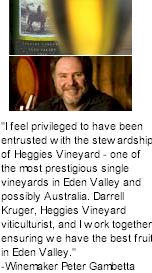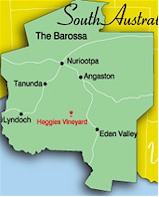


The concept of terroir is the best way to describe the combination of elements that creates the distinctive flavour profiles of Heggies Vineyard wines. Unpredictable and at times downright frustrating is an apt description for this unique Eden Valley Vineyard. At 550 metres above sea level, Heggies is one of Australia's highest altitude vineyards and also one of its coolest.

The magnificent sweep of country that is the Heggies Vineyard had been grazing land for most of its settled history and was owned by local grazier and bushman, Colin Heggie, before being purchased by Wyndham Hill Smith, then co-proprietor of the Yalumba Wine Company.
Friends since school days, Colin and Wyndham's friendship continued into adulthood and throughout their lengthy negotiation over the purchase of Heggie's land - a negotiation that was, it has been suggested, not much more than an excuse for relaxed chats. Planting began in 1971 on the tough North Eastern corner of the property and the first wine was released in 1979. It was the first wine to bear the idiosyncratic label that features a drawing of Colin Heggie, the bushman, looking out over the fledgling Heggies plantings astride his faithful chestnut, Jack.
At Heggies Vineyard, the close-planted clonally-selected grafted vines are grown in semi-drought conditions. The soil is lean and hungry - a thin layer of grey sandy loam over clay and decomposed rock - and the vines compete vigorously for moisture and nutrient. This competition encourages the vines' roots to dig deep into the soil where it is moist and cool throughout all seasons.

For such a unique vineyard - standard vineyard management at Heggies is impossible. Each grape variety has its own programme of care according to its position in the vineyard. Trellising and canopy structure is varied from vine to vine, as are pruning regimes and row spacings. Working with the natural advantage rather than against it is the driving force in working the vineyard and every factor is taken into consideration, including the micro-climates within the vineyard, aspect and soil type.
The main advantage of the tailored vineyard management is the flexibility it affords. Staggered maturity times for the grapes allow some breathing space to give each variety the specialised attention required during harvest and throughout the early winemaking stages - the only way of ensuring each wine is able to develop its own character and personality.
Trial and experimentation is an important part of life at Heggies Vineyard. Winemaker Peter Gambetta has introduced a number of innovative winemaking practices to Heggies Vineyard, including the use of naturally occurring wild yeast ferments and strictly controlled oak influence in the oaked wines. The innovation will continue through Heggies passionate philosophy in success and knowledge through experimentation and persistence.
"It's a tremendously challenging vineyard and not an easy one to manage", says winemaker Peter Gambetta. "Each variety has its own programme of care according to its position in the vineyard. Working with the natural surroundings rather than against them is the driving force, with every factor taken into consideration, to try and capture the flavour and balance of the grapes in their purest essence."
